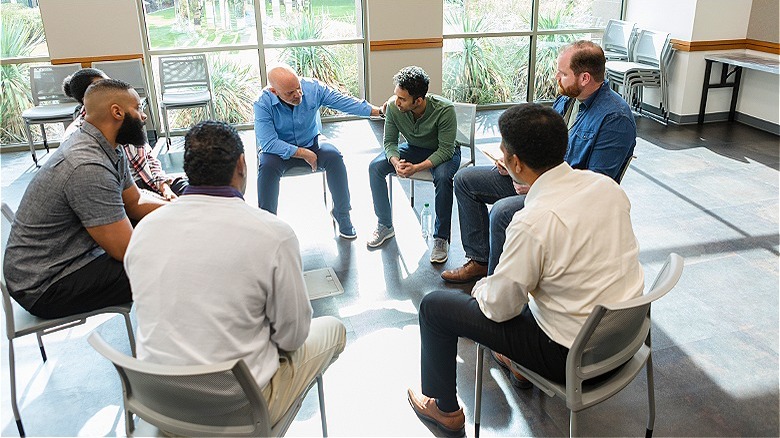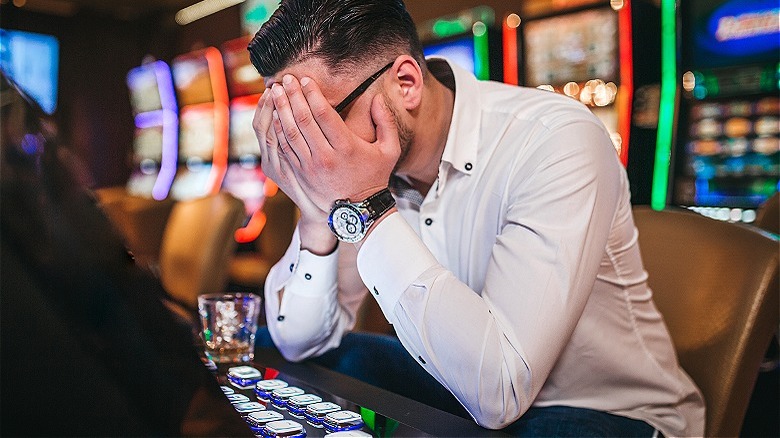What You Can Do If You Know Someone With A Gambling Problem
While having an addiction to anything can eventually lead to financial ruin (as evidenced by a few people who have won the lottery and ended up broke), perhaps no addiction so directly impacts someone's financial situation as a gambling disorder. A gambling disorder is a pattern of compulsive behaviors leading to no self-control around betting and an inability to stop even when the chips are down, literally. Per a 2012 study published in the Indian Journal of Psychological Medicine, this type of disorder can be broken down into two categories: problem gambling and pathological gambling.
Problem gambling is demonstrated by a need to gamble or secure enough money to gamble, even as red flags pop up to warn of impending danger. The next level of problem gambling is pathological gambling. This goes beyond the realm of undisciplined compulsion and crosses over into a psychological disorder where preoccupation with betting, a need for ever higher stakes, a willingness to commit illegal acts for gambling money, and even physiological changes — lowered fight or flight response caused by lowered norepinephrine — come into play at this level of addiction.
If you have a loved one or friend suffering from gambling addiction, here are some steps you can take to help.
1. Recognize the behavioral signs
Revised in 2018, Greo Evidence Insights, in collaboration with gambling research experts, created a framework highlighting factors that influence gambling addiction. These include environment and/or a proximity to gambling, exposure, and cultural attitudes toward gambling. Social connections were also a factor, as was peer pressure, and a lack of resources for problem gamblers. Even the type of gambling can affect addictive behaviors since games of chance, such as the lottery or slot machines, trigger different motivators than games influenced by skill, like poker.
Before you can help someone with their problem, you need to be able to recognize that they have one. Behaviors like the incessant pursuit of higher stakes gambling, a preoccupation with wins and losses, covering up gambling activity, and an inability to manage their desire to gamble are a few of the more obvious signs. They'll also be borrowing or taking money from anyone around them so they can place bets. If the person you're concerned about has a sudden unexplained dive or rise in mood based on gambling or is willing to continue placing bets even as their relationships crumble, then there's an excellent chance you may have a problem gambler in your midst.
2. Get professional advice
Assuming this is all new to you, managing an individual's problem gambling isn't going to be a walk in the park. That's why you should seriously consider asking for help. In January 2024, Sens. Richard Blumenthal and U.S. Representative Andrea Salinas introduced the Gambling addiction Recovery, Investment, and Treatment Act, or GRIT. The legislation attempts to offset the $7 billion societal cost of gambling addiction (health care, criminal justice, bankruptcies, and unemployment) by redirecting 50% of the sports excise tax on sports betting into funding for treatment, prevention, and further study of gambling addiction.
Some of that funding would hopefully go into more programs like the National Problem Gambling Hotline 1-800-GAMBLER, a 24-hour national hotline that directs those in need to local resources, including therapists, support groups, and counselors. The hotline also offers support to the loved ones of gambling addicts. You can also find a list of 34 state gambling hotlines on The Action Network.
3. Protect yourself emotionally and financially
While burning the candle at both ends may seem like a selfless move, it can actually hinder your progress and add to the problems. As explained by Healthline, caregiver burnout comes as a result of overloading yourself with the emotional weight of helping someone else. This care can lead to the deterioration of your own health and well-being, in the worst cases turning into clinical depression. Burnout can manifest physically in the form of unexplained aches and pains, rapid weight loss from lack of appetite, headaches, and sleeplessness. It can cause anxiety, exhaustion, moodiness, and seclusion.
A problem gambler can have a financial impact on their family as well. Infatuation with gambling will likely lead to constant requests for money from family and friends, and depending on how much loss they accumulate and to whom, a need to step in with your own finances to cover their losses. Tough love should be exercised in these situations when possible. That's more difficult in the case of a spouse you share a home with, where refusing to cover the mortgage could end up in you learning what it means to go into foreclosure. Wherever possible, redirect money requests and also set clear boundaries between your finances and the problem gambler.
4. Seek out treatment options
Now it's time to figure out how you're going to help the person with gambling issues. While your loved one may be exhibiting all the signs of gambling addiction, a clinical diagnosis is a good place to start. The caveat is that the person must be ready for treatment, since any coercion or forcing addicts into treatment tends to inspire resistance and relapse.
Most therapies revolve around self-help group meetings like Gamblers Anonymous, cognitive therapy to address toxic beliefs and thoughts, and behavioral therapy to help the problem gambler manage problem behavior. There's also therapy for the family of gamblers. It's important to consider that these types of treatment programs can be initiated in different ways. In-patient or residential treatment centers, weekly group meetings, virtual and even phone counseling with addiction specialists, are all possibilities you can tailor to your budget and schedule.
Aside from sources for help for problem gambling, you might want to have crisis hotlines on hand, too. Rutgers University Center for Gambling Studies research found that 28% of gamblers have suffered from self-harm ideation.
If you or someone you know is struggling or in crisis, help is available. Call or text 988 or chat 988lifeline.org.
5. Plan an intervention
When staging an intervention, note that there are professional interventionists who can help create a game plan and a safe environment. If things get tense during the intervention, these professionals are trained in de-escalation techniques to help keep everyone safe and make for a smoother transition to care for the problem gambler. Typically, close friends and family prepare notes ahead of time to share with the gambling addict. Usually, this includes specific incidents when the addict acted in a way that caused concern or was generally disruptive to the intervention participants' lives. The conclusion of the intervention will typically leave the gambler with a choice: recognize their addiction and seek treatment, or face potential breaks from their close family friends.
Note that, generally, interventions aren't covered by insurance and can cost as much as $18,000 on the high end and about 10% of that on the lower end. What you get for your money, however, is a reliable, experienced professional who can support, advise, and communicate your concerns on your behalf. You're potentially competing against trauma, emotional or psychological dependencies, and all the sneaky ways casinos trick people into spending money. You'll want to call in the big guns to assist, and that may mean paying a pretty penny for them.





